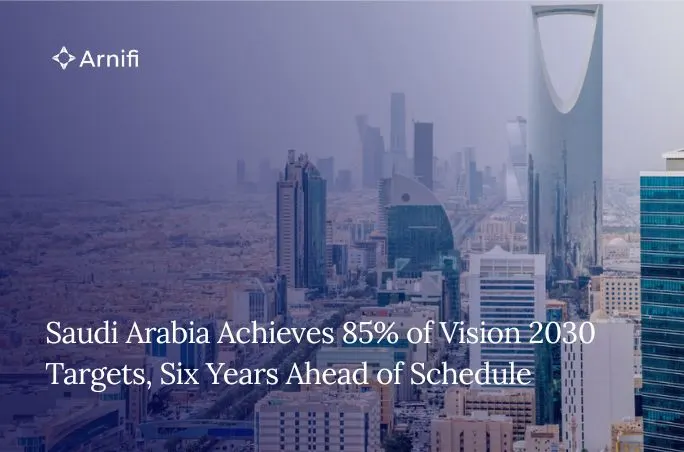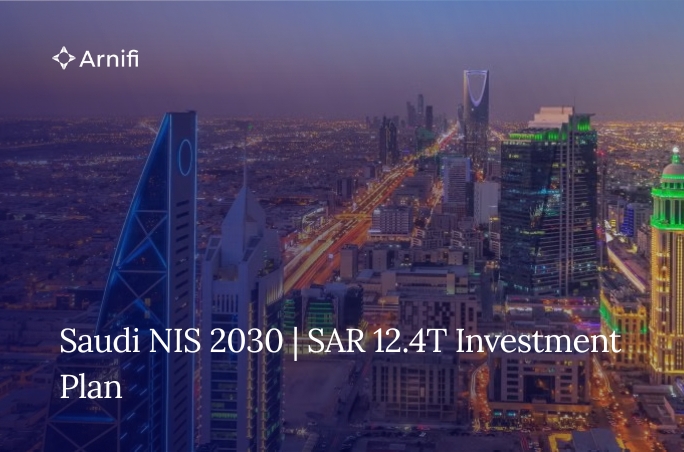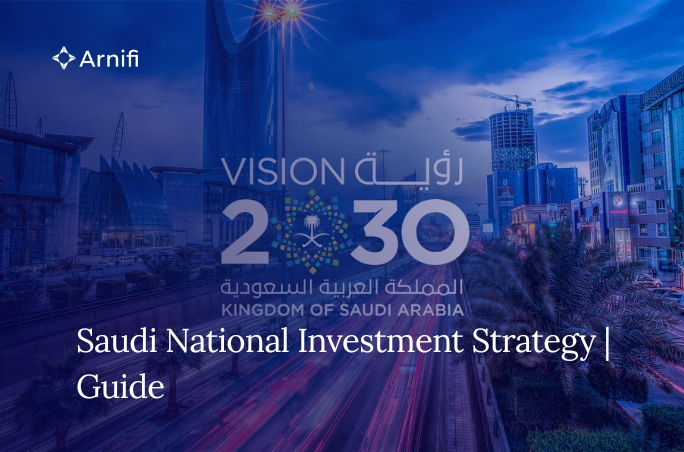Saudi Arabia Achieves 85% of Vision 2030 Targets, Six Years Ahead of Schedule
by Ishika Bhandari Oct 31, 2025  6 MIN READ
6 MIN READ

Table of contents
- A Vision Turned Reality Ahead of Time
- Economic Diversification Gains Momentum
- Tourism and Investment Reforms Pay Off
- Energy Transformation and Sustainability Goals
- Social and Cultural Transformation
- Global Partnerships and Strategic Influence
- Looking Ahead: What’s Next for Vision 2030
- A Model for the Region
Saudi Arabia has completed about 85% of the ambitious Vision 2030 targets scheduled to be completed almost six years ahead of the actual deadline. This marker in itself is truly remarkable because it demonstrates the rapid transformation of the Kingdom and its successful march toward economic diversification and transformation innovations in social development.
A Vision Turned Reality Ahead of Time
Vision 2030, launched in 2016 under the leadership of Mohammad Bin Salman, Crown Prince, was meant to ultimately reduce dependency on oil; empower the private sector; and develop the economy towards another socio-diversifying and sustainable economy.
Recent reports from the government of the Kingdom show that its advanced schedule is actually in most of its targets for reforms, including infrastructure, technology, energy transition, and quality of life. All of these, pointed out by the Crown Prince, imply that such progress emanates from a wholly united national effort across ministries, private entities, and citizens’ involvement in modernizing while preserving the core cultural values of the country.
Economic Diversification Gains Momentum
The Vision 2030 objectives have therefore mainly focused on diversifying the economy of the Kingdom of Saudi Arabia and subsequently lessening its dependence on oil revenues. Non-oil industry sectors, namely tourism, manufacturing, logistics, mining, and financial services, have seen phenomenal growth, all of which have led to the implementation of the Vision.
This continuous growth in non-oil GDP in the Kingdom significantly exceeds expectations due to the burgeoning public and private investments that are flowing into this country. Example efforts are included in the National Industrial Development and Logistics Program (NIDLP), the Public Investment Fund (PIF), and mega-developments like NEOM and The Line, which have been harnessed to seek an accelerating infrastructure expansion and job creation frontier.
The government’s small- and medium-sized businesses-tending eye is paying dividends, as now the SME sector is contributing a lot more to the economy compared to what it did back in 2016.
Tourism and Investment Reforms Pay Off
Saudi Arabia has opened its doors to the world, as one says, to let global visitors in with new and easier visa regulations and marketing campaigns around the world. Tourism is slowly branding itself as the major showcase for Vision 2030.
Millions of tourists have flocked to the Kingdom this year from AlUla, Diriyah, and the Red Sea Project. Riyadh’s hosting of mega-glistening global events and sporting tournaments has sewn up the country’s soft power and outward image now.
Indeed, an increase in tourism is expected in Saudi Arabia now on its path to realizing an intended annual visitation rate of 150 million tourists by 2030, a very ambitious target that is now looking pale into possible attainability before schedule.
Energy Transformation and Sustainability Goals
Traditionally esteemed as an oil giant, Saudi Arabia has invested in renewables and other sustainable technologies in recent years. Clean energy developments under the full spectrum of Vision 2030 include the large solar and wind farms within the Saudi Green Initiative. Renewable city model development in NEOM and the hydrogen production works are planned to put the Kingdom on the global map as an innovator in green energy. The government wants 50% of the electricity to be produced from renewable energy by 2030. This target now looks possible to achieve way before time.
Social and Cultural Transformation
Apart from the economy, Vision 2030 has given rise to a cultural and social revolution in the Kingdom. The introduction of entertainment zones, cinemas, concerts, and international festivals has opened new avenues in the lifestyle choices available to the Saudi populace and residents.
Women’s empowerment remains among the success stories. Participation of women in the workforce has almost reversed; there are currently more women in leadership in both public and private sectors. Several government initiatives for education, digital literacy, and youth entrepreneurship have created an inclusive and future-ready society.
Global Partnerships and Strategic Influence
On the other hand, the rapid action introduced by Saudi Arabia with regard to such reforms strengthens its global profile. The Kingdom continues its efforts to build up strong partnerships with nations across the globe, mostly in the areas of technology, defense, and finance, with a special focus on investment via the use of its PIF.
Outside of these events, Saudi Arabia’s reputation as a diplomatic and economic global player continues to rise, exemplified by its recent hosting of the World Defense Show, Future Investment Initiative, and COP-related events. With Vision 2030 as a blueprint for long-term change, Saudi Arabia recently became a new stakeholder in the quest for regional stability and global economic advancement.
Looking Ahead: What’s Next for Vision 2030
Despite the Kingdom having exceeded the majority of its targets early, the Saudi leadership claims the journey is by no means over. Evolving with the other goals geared towards building economic resilience and advancing foreign investment and technological innovations has now opened the door for digital transformation, which is bound to be the direction of future phases of Vision 2030. The impact of such a focus will redefine the relationship between the Kingdom and the global economic trends of the future, including digitalization, artificial intelligence, and sustainability.
Officially, the early triumph of Vision 2030 is said not to convey a sign to slow down but rather serve as a conservation impetus. The continued focus on diversification, innovation, and improvement in quality of life forms the core of the long-term strategy of the nation.
A Model for the Region
With its progress, Saudi Arabia has become a role model for other Middle Eastern countries that are traveling on reform trajectories. With a combination of visionary leadership and decisive execution, the Kingdom has shown that large-scale transformation can be done in a decade and thus proved that it is achievable.
The credit earned through Vision 2030 not only constructs a domestic economy in Saudi Arabia but also develops regional growth and stability, designing new avenues for international investors, entrepreneurs, and partners wishing to work with one of the world’s fastest-moving markets.
Top Saudi Arab Packages

Related Articles
Top Saudi Arab Packages



